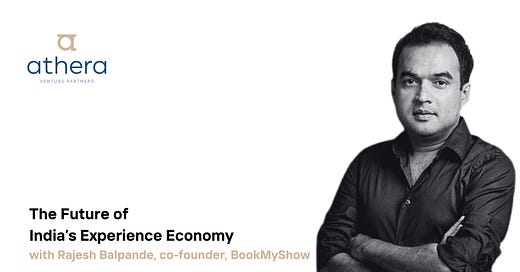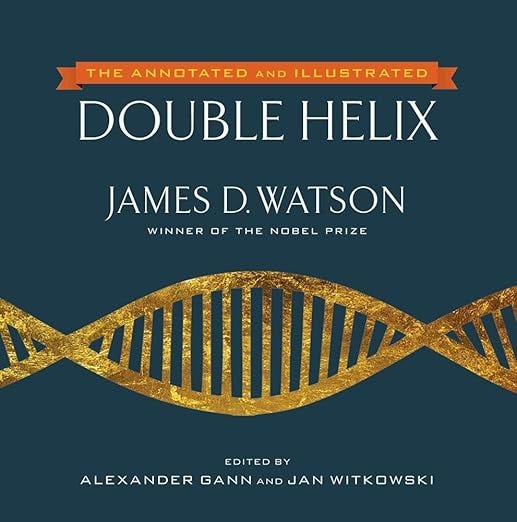October 2024 | Athera's Odyssey: India's Experience Economy
The festive season is here! What's happening in the experience economy? Let's dive into Athera's Odyssey to find out.
In this month’s edition of Athera’s Odyssey, we cover:
Ecosystem Stories: Learn how BookMyShow's co-founder Rajesh Balpande thinks about India's experience economy.
Athera Almanac: Rajiv Mehta shares his first-principles approach towards life, his learnings being the MD of PUMA South Asia, and why he chose being in VC!
Ecosystem Stories with Rajesh Balpande
Rajesh Balpande knows a thing or two about creating and curating experiences.
In 1997, he co-founded BookMyShow along with Ashish Hemrajani and Parikshit Dhar.
What was the problem statement?
Rajesh: “The basic problem was that there was no information available about how many tickets were going to be sold or whether tickets were going to be available, so we wanted to make it convenient for people to buy movie tickets. Back then, there were only single screens, no automated systems, and we even started by running a call center and delivering physical tickets to customers on motorbikes.”
That’s right.
The company that’s bringing world-class acts to India once started out delivering tickets on bikes!
From L-R: Rajesh, Ashish, and Parikshit
But the globe-trotting live events came much later, to be fair.
There’s a famous saying that when it comes to celebration, the middle class Indian has only two places to go: Restaurants or Movies.
Rajesh: “Around 2007, with Web 2.0 gaining momentum, we recognized the need to re-enter the consumer space, since we had left that to go the B2B route by helping multiplex chains with software. We relaunched our consumer business, initially focusing solely on movie tickets. As our movie ticketing business grew, we noticed we had built a substantial customer base of entertainment seekers. This realization led us to explore expansion into other vertical markets”
As BMS survived the dotcom bubble burst, they thought of expanding into two new verticals along with movies, albeit a few years later: Sports and Live Events.
The middle-class Indian got richer around the 2010s. And got more avenues to spend their time and money.
Experiences lay in a sweet spot to be captured, as the aviation and hospitality industries were also picking up steam.
While the BookMyShow story was going smoothly for the large part, the pandemic initially upended their revenues since physical events had been rescinded.
Rajesh: “During the pandemic, while a lot of businesses suffered, online businesses thrived. It was a huge opportunity for the online space, and the consumption of people really changed. We were stuck at about 200-300 million users for a long time, but the pandemic was the breakout—our user base almost doubled. The shift in consumer behavior and increased online consumption played a key role in driving this change.”
It’s interesting to note that only a few years after the pandemic, people want to attend less of the ‘Zoom-only’ events.
Lollapalooza, a renowned music festival made it’s grand entry to India in 2023 via BookMyShow
“Revenge Spending”, as this article by Wall Street Journal suggests, is about spending on experiences. An entire generation has spent the golden years of their lives in lockdown. Now, they want out.
In 2024, the discerning young Indian isn’t just buying consumer goods. The iPhones are flying off the shelves, but so are the tickets to Coldplay shows. It’s worthy of noting here that BookMyShow was the platform which saw tickets of the UK band’s upcoming performance getting claimed by the millisecond.
We’re in the thick of the Diwali season, but the festivities aren’t just limited to gold and sweets. It’s concerts, seminars, and ‘workations’ too.
But what does the future look like?
Rajesh: "The next 10 years are going to see a significant shift in consumer spending. This is the new age economy, where people don't really believe in saving as much—they want to go out, travel, and have experiences, even overspending at times.
We're going to witness big changes in how consumers spend, especially on experiences like live entertainment and international-standard shows."
Charu Mittal, who looks into brand partnerships at a foodtech company’s live entertainment division said, "It’s like everyone went from “Netflix and chill” to “Let’s live and thrill” mode. For today’s digital natives, it’s about opening their minds to new, unique experiences. There’s only so much screens can do.”
She’s been in the events space for close to a decade, and has observed some key changes in the recent years.
Charu: “The biggest revelation for me has been that people don’t just want to attend events, they want to be in the spotlight. This generation prioritizes experiences where they can meet new people and be part of something bigger. They’re participants who want to dig deep and uncover layers. So, the more you can involve them, the more you’ll keep them hooked. It’s all about making them the star of the show, in my opinion.”
“The Experience Economy Is For Every Business” by Naomi Simson
But from a business perspective, is there an opportunity for brands to capture key chunks of the value chain?
Rajesh was excited about the future.
Rajesh: "See, the live entertainment space in India is still in its build-out phase—there's a lot of capital investment required, and infrastructure is lacking.
BookMyShow’s 2023 financials, where they posted 83CR in profits.
It's not a business that can scale overnight like some other sectors. Entrepreneurs need to be mindful of unit economics and ensure that every project is viable, especially given the high costs and risks associated with some artists or events."
He further went on to say that in a value-conscious market like India, getting the price correct is extremely important.
Rajesh: “Even a small difference, like 1999 vs. 1499, can make or break an event. It’s also important to balance the big, monolithic events with smaller, niche experiences, as both are shaping the future of the experience economy."
Meanwhile, Charu said that she advised brands to think small before they can go big.
“Brands should definitely kick things off with a smaller, more intimate setting that allows this experience-driven generation to connect on a deeper level. It’s a bit of a fool’s errand to go big right from the get go. You have to test the waters.”
But what does the path look like for scaled-up brands like BookMyShow?
Kunal Manchanda and Harsh Upadhyay of Entrackr sum it up well:
“What is truly commendable is the role it has played in the nurturing of the live events ecosystem in the country for instance, by taking care of a key aspect of these-audience generation. So much so that the app is a destination for many when seeking out options, instead of being the place to go to for bookings after making up their minds. In that small transition lies its greatest value and strength today.”
After years of effort and numerous model iterations, BookMyShow is starting to see the fruits of its labor.
Even with the increased competition that has emerged in the post-pandemic landscape, it stands out as a leader in its field.
India’s experience economy is only getting started!
Athera Almanac: Journey of a GP
Before we get to Rajiv Mehta’s journey, we thought it’d be great to also gain his perspectives on the experience economy.
“As Rutvik always mentions, for time in memorial, we were hunter-gatherers, we've always been in tribes, right? The first instinct of people in tribes is to preserve your tribe, to keep well connected within the tribe. That's how families came into being and that's how friends and friendships came into being. So a physical contact and a physical connection is extremely important for the human being.
The experience economy is an offshoot of our consumption-driven economy, building experiences in nuclear families while highlighting a desire for community.
Successful brands today understand the importance of being present both online and offline. Companies that started as digital-first, like Nykaa or Lenskart, have recognized the need for physical presence to enhance customer engagement and brand loyalty.”
It’s interesting to note here that only last week, Nykaa actually went on to produce its first ever ‘live experience’ called Nykaaland in Mumbai, celebrating beauty and lifestyle with thousands of young men and women over a three day festival.
Let’s get to Rajiv’s top three learnings from his journey so far.
Potential, Not Years of Experience: I completely underscore someone's experience and I over index on pedigree and attitude. If someone has gone to premier institutes, they’ve already crossed the checkpoints for intellect and grit. After that, what matters is the attitude you carry, not how many years you’ve worked in a firm.
Take The Bold Step: I think Puma Social Club, when I was MD of Puma India, was one example that if you want Puma to be part of your 24/7 routine, why not make it a part of your life even in the evening after work? Puma Social Club was born out of that thought and hence that was a bold step. Had it not worked out for us, we would have paid a few mistakes, losses, etc. And then moved on. But folks in Bengaluru absolutely loved it. You’ll only know if you try.
Celebrate The Team: Not a single person is ever behind the success of any company. It's always a team. So if someone comes and claims that I did this for Puma or I did this for Arvind or I did this for Athera, it is not the right way to look at it. There is always a team who is out there working towards something big. The real work is done by the ones below. So. The employees alone without direction will not go anywhere. And the leader without the employee will not reach anywhere. So you need a team. And it's always a team walk. Initially you also have your ego and you say, I'm the CEO, I'm the MD. But that's entirely beneficial.
Why go the VC way?
Look, as I was considering the next stage of my career, there were three key priorities that were very clear to me:
I wanted to be able to control my own time. Having a well-established business that's almost on autopilot, or being in a solid partnership, would allow me to truly control my schedule without having to answer to anyone else. This was my top priority.
I had already accomplished a lot of the typical corporate milestones early on - being a CEO, MD, etc. The ego boost and status of those titles no longer held the same appeal for me. I was ready for a new challenge.
I didn't want to be beholden to a boss, stakeholders, or the constant pressures of running a public company. Having to constantly explain myself, my sales numbers, and decisions to others was not something I wanted to deal with anymore.
As I thought about becoming an investor, I realized there were some tradeoffs I'd have to come to terms with:
As an investor, I would have less direct control over the company's destiny compared to being the founder. I could advise and influence, but never fully control the founder's decisions.
I also knew I would never make as much money as the founder, even if the company did extremely well. I'd always be in an investor role making a smaller return.
And I accepted that I would never get the same level of recognition and limelight as the founder, no matter how instrumental I was to the company's success.
Ultimately, I was comfortable with these limitations because the upsides aligned so well with my priorities. Being an investor meant I could control my own time, not be beholden to others, and focus on advising and growing companies rather than being in the spotlight.
It was the right fit for me, even if the path wasn't as glamorous as some perceive.
And I’m glad that with Athera, I have found high-calibre folks who are truly the best people to work with. They help me grow not only as a VC, but become a better person too.
Pathways
With the festive season around the corner, and with it the hunt for lasting gifts for our loved ones, let us take a moment and think about the gift of good old literature!
These books not only provide captivating stories and insights but also make beautiful keepsakes and can be read without much initiation into the context in which they were written.
Happy gifting, and may these stories enrich the lives of those you cherish!
Fiction
The Illustrated Silmarillion by J.R.R. Tolkien is a stunning edition with beautiful illustrations that bring Middle-earth to life. This collectible is perfect for fans of epic fantasy. If you’ve not read Lord of the Rings, no matter - this is, in any case, the lliterary prequel; and a fantasy work of unparalleled depth for all ages.
Science
Annotated and Illustrated Double Helix by James D. Watson features detailed annotations and captivating illustrations, offering a unique insight into the discovery of DNA’s structure.
Culture
Finally, an oddly fun one — A History of the World in 6 Glasses by Tom Standage explores the impact of beverages on history. Tom covers six beverages — beer, wine, spirits, coffee, tea, and cols — and tracks how intricately they’re woven with human civilization.














